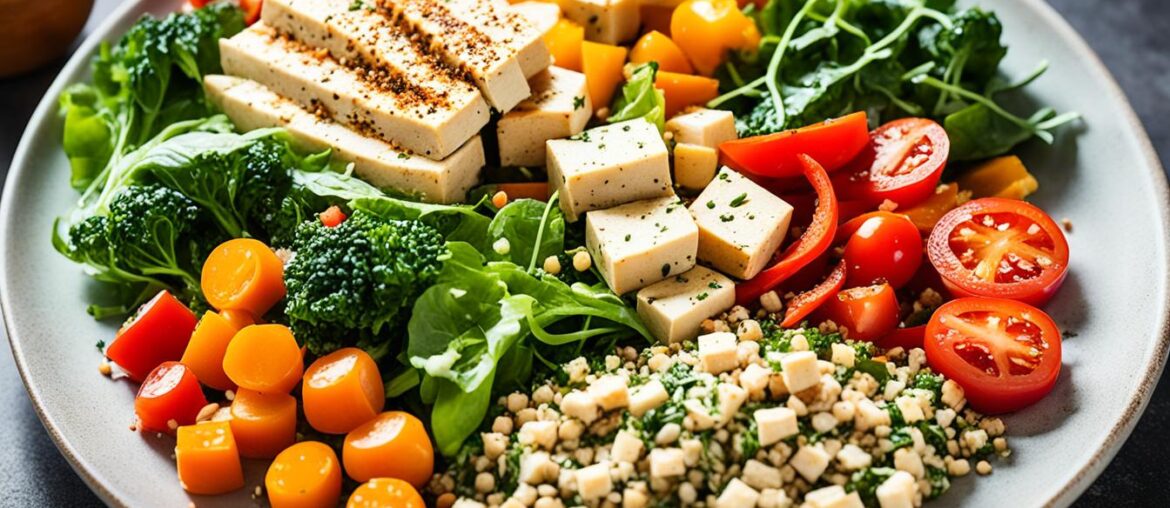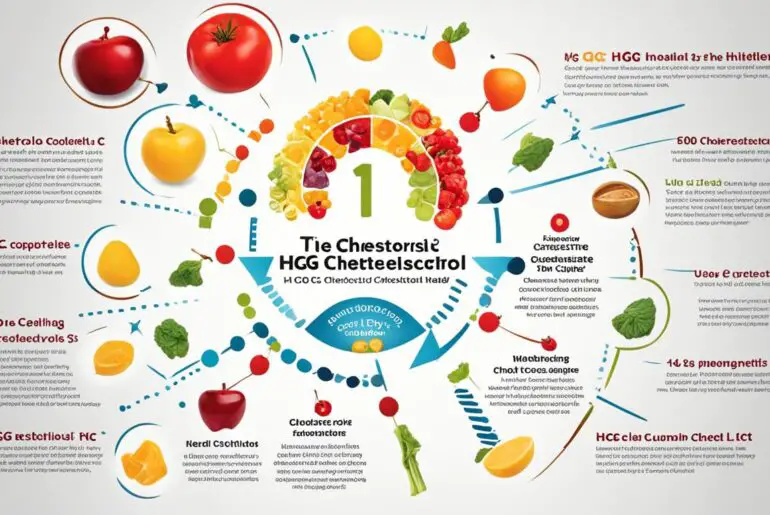Are you a vegetarian considering the HCG diet but worried about the lack of options for plant-based protein? Finding vegetarian-friendly meal plans on this popular weight loss regimen can be a challenge. However, I have good news for you! In this article, we will delve into the world of vegetarian HCG diet options, offering tailored meal plans and plant-based alternatives to ensure you can achieve your weight loss goals without compromising your dietary preferences.
Key Takeaways:
- Discover a variety of vegetarian-friendly protein sources for the HCG diet.
- Explore an extensive list of plant-based vegetable options to incorporate in your meals.
- Learn about the fruits you can include in your HCG diet plan.
- Find out about carbohydrate sources suitable for vegetarians on the HCG diet.
- Discover the beverage choices available for vegetarians on the HCG diet.
Vegetarian-Friendly Protein Sources
While the HCG diet typically includes animal protein sources like chicken, beef, and fish, there are several vegetarian-friendly protein options that can be substituted. These alternatives provide vegetarians on the HCG diet with the necessary protein intake to achieve their weight loss goals.
Protein Powder
One of the easiest and most versatile ways to incorporate vegetarian-friendly protein into your HCG diet is through protein powder. Options like rice protein powder, natural whey powder, and sun-warrior protein are excellent choices. Make sure to choose powders with 5 grams of carbs or less per serving and sweetened only with stevia or xylitol.
Cottage Cheese
Cottage cheese is another protein-rich option for vegetarians on the HCG diet. It is low in carbs and can be enjoyed as a snack or added to meals for an extra protein boost.
Tofu
Tofu is a versatile plant-based protein that can be used in a variety of dishes. It can be baked, grilled, or stir-fried to add protein to your meals without compromising your vegetarian diet.
Eggs
Eggs are a nutrient-dense protein source and can be cooked in various ways to suit your taste. Whether you prefer them boiled, scrambled, or poached, eggs are an excellent option for vegetarians on the HCG diet.
Quinoa
Quinoa is a complete protein that contains all nine essential amino acids. It can be used as a base for salads, added to soups, or served as a side dish to increase your protein intake on the HCG diet.
Beans
Beans, such as kidney beans, black beans, soybeans, and adzuki beans, are high in protein and can be included in meals as a vegetarian-friendly protein source. They can be used in various recipes, including soups, stews, and salads.
By incorporating these vegetarian-friendly protein options into your HCG diet, you can ensure that you meet your protein requirements while following your vegetarian lifestyle. Experiment with different recipes and meal combinations to keep your diet interesting and enjoyable.
Incorporate vegetarian-friendly protein sources into your HCG diet to achieve your weight loss goals.
Vegetarian-Friendly Vegetable Options
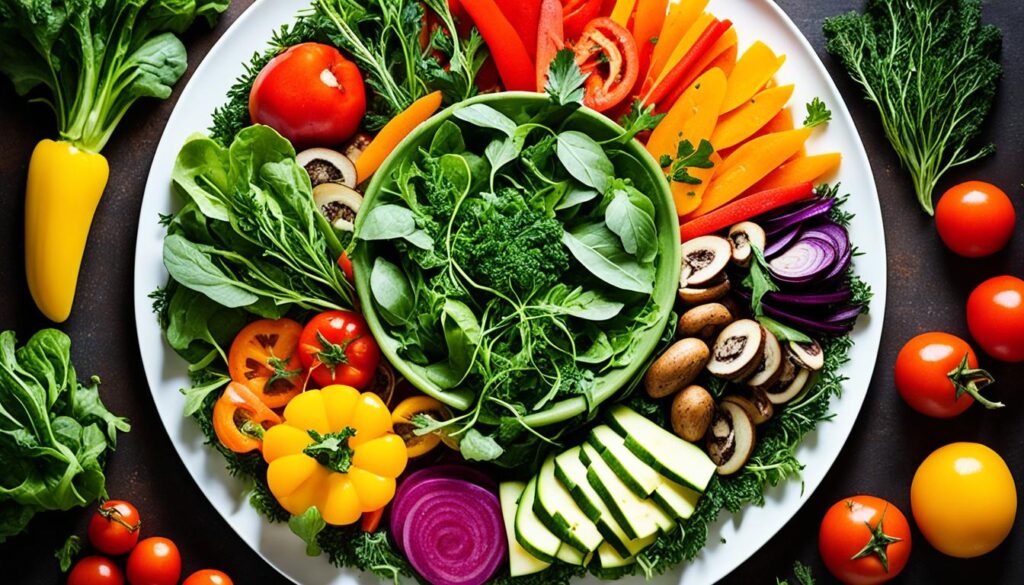
Vegetarians on the HCG diet have a wide range of vegetable choices that can be incorporated into their meals. These vegetarian-friendly vegetables provide essential nutrients and contribute to a satisfying and well-rounded diet.
When following the HCG diet, vegetarians can enjoy options such as:
- Kale
- Spinach
- Lettuce
- Chard
- Chicory
- Cucumbers
- Cabbage
- Tomatoes
- Asparagus
- Onions
- Celery
- Broccoli
- Radishes
- Beet greens
- Brussels sprouts
- Green beans
- Mushrooms
- Peppers
- Zucchini
- Cauliflower
- Dill pickles
- Bean sprouts
- Beets
- Squash
- Eggplant
- Bok choy
- Pumpkin
- Fennel
These vegetables can be consumed either raw or cooked, and it’s essential to have one serving of vegetables per meal. To ensure optimal digestion, it is recommended to avoid mixing them together.
Health Benefits of Vegetarian-Friendly Vegetables
The vegetarian-friendly vegetable options mentioned above offer numerous health benefits. They are rich in vitamins, minerals, and fiber, which contribute to overall well-being. Additionally, these vegetables are low in calories and can aid in weight loss, making them ideal choices for individuals following the HCG diet. Incorporating a variety of these vegetables into meals can help vegetarians maintain a balanced and nutritious diet.
| Vegetable | Health Benefits |
|---|---|
| Kale | High in vitamins A, C, and K, as well as minerals like calcium and iron |
| Spinach | Rich in antioxidants and an excellent source of vitamins A and K |
| Lettuce | Low in calories and a good source of vitamin K and folate |
| Broccoli | High in fiber, vitamins C and K, and contains compounds with potential anti-cancer properties |
| Tomatoes | Rich in vitamins A and C, as well as lycopene, an antioxidant with potential health benefits |
Fruit Options for Vegetarians on the HCG Diet
As a vegetarian on the HCG diet, you have a wide range of fruit options to choose from to add variety and flavor to your meals. Fruits provide essential vitamins, minerals, and fiber while adding a touch of sweetness to your diet. Here are some delicious fruit choices that are suitable for your vegetarian HCG meal plan:
- Apples: Crisp and juicy, apples are a great low-calorie option for a snack or a refreshing addition to salads.
- Oranges: Bursting with vitamin C, oranges are both hydrating and invigorating. Enjoy them sliced or squeezed for a refreshing drink.
- Grapefruits: Known for their tangy and slightly bitter taste, grapefruits are a fantastic source of hydration and essential nutrients.
- Strawberries: These sweet and succulent berries are a delight to the taste buds. Enjoy them fresh or blend them into a delicious smoothie.
Remember, you are allowed two servings of fruit per day on the HCG diet. You can enjoy these fruits with your meals or as a snack between meals for a satisfying and nutritious experience. Incorporating fruits into your vegetarian-friendly HCG diet can help you stay on track while enjoying a wide range of flavors.
Now let’s take a look at a table that provides a visual summary of the fruit options available to vegetarians on the HCG diet:
| Fruit | Description |
|---|---|
| Apples | Crisp and juicy fruit that can be enjoyed as a snack or added to salads. |
| Oranges | Tangy and refreshing citrus fruit packed with vitamin C. |
| Grapefruits | Bitter-sweet fruit that provides hydration and essential nutrients. |
| Strawberries | Sweet and succulent berries perfect for snacking or adding to smoothies. |
By incorporating these vegetarian fruit options into your HCG diet, you can enjoy the benefits of a plant-based diet while working towards your weight loss goals. The variety and natural sweetness of these fruits will help satisfy your cravings and keep you motivated throughout your HCG journey.
Carbohydrate Sources for Vegetarians on the HCG Diet

Although the HCG diet restricts the consumption of regular bread or crackers, there are still carbohydrate options available for vegetarians. Breadsticks or melba toast can be excellent alternatives to meet the carbohydrate requirements while following the HCG diet. It’s important for vegetarians to include one serving of carbohydrates with each meal. However, it is crucial to choose low-carb options and avoid starches that are not recommended on the diet.
Below is a list of vegetarian-friendly carbohydrate sources for the HCG diet:
| Carbohydrate Source | Serving Size |
|---|---|
| Breadsticks | 1 stick |
| Melba Toast | 1 piece |
Note: Remember to check the packaging and ensure that the breadsticks or melba toast you choose are suitable for the HCG diet, with low-carb content and no added sugars or fats.
Including these vegetarian-friendly carbohydrate options in your HCG diet can help provide the necessary energy and balance to your meals. Remember to always consult with your healthcare provider or a nutritionist before making any major changes to your diet plan.
Beverage Choices for Vegetarians on the HCG Diet
As a vegetarian on the HCG diet, you have a range of beverage choices to refresh and hydrate yourself throughout the day. Staying properly hydrated is crucial for maintaining overall health and supporting weight loss. Let’s explore some of the vegetarian-friendly drink options and guidelines for the HCG diet.
1. Tea, Coffee, and Herbal Teas:
You can enjoy tea, coffee, and herbal teas in any quantity while following the HCG diet. These warm beverages can be a comforting addition to your daily routine. Remember to avoid sweeteners or add-ons that may contain extra calories or interfere with the diet’s effectiveness.
2. Green Tea:
Green tea is an excellent choice for its potential health benefits and antioxidant properties. It can support your weight loss journey while providing a gentle boost of energy. Incorporating green tea into your beverage rotation can be a refreshing change.
3. Water:
Water is essential for proper hydration and plays a vital role in weight loss. It’s recommended to drink 10-16 glasses of water per day while on the HCG diet. Adequate hydration can help control hunger, support digestion, and flush toxins from your body.
4. Dairy Alternatives:
Instead of regular cow’s milk, opt for vegetarian-friendly alternatives like soy milk or almond milk. These plant-based options can be used in small quantities, in line with the HCG diet’s guidelines.
5. Lemon Juice, Apple Cider Vinegar, and Seasonings:
Incorporating lemon juice or apple cider vinegar into your water can add flavor and provide potential health benefits. These natural additives can aid digestion and support detoxification. Additionally, using a variety of seasonings and spices can enhance the taste of your meals and help you adhere to the diet plan.
Remember to consult with a healthcare provider or nutritionist before making any significant changes to your diet or beverage choices. They can provide personalized guidance and ensure that your chosen options align with the HCG diet’s restrictions and requirements.
| Beverage | Description |
|---|---|
| Tea | Various flavors, such as green, black, or herbal teas, can be enjoyed in moderation. |
| Coffee | Caffeinated or decaffeinated coffee can be consumed, but avoid sweeteners or creamers. |
| Herbal Tea | Enjoy a wide range of herbal teas, like chamomile, peppermint, or ginger, for a soothing beverage option. |
| Green Tea | A refreshing choice with potential health benefits and antioxidants. |
| Water | Stay hydrated by drinking 10-16 glasses of water per day. |
| Dairy Alternatives | Opt for soy milk or almond milk as alternatives to regular cow’s milk, in line with the diet’s guidelines. |
| Lemon Juice | Add lemon juice to your water for a burst of flavor and potential digestive benefits. |
| Apple Cider Vinegar | Include apple cider vinegar in your beverages to aid digestion and support detoxification. |
| Seasonings | Experiment with a variety of seasonings and spices to enhance the taste of your meals. |
Protein Powder Options for Vegetarians on the HCG Diet
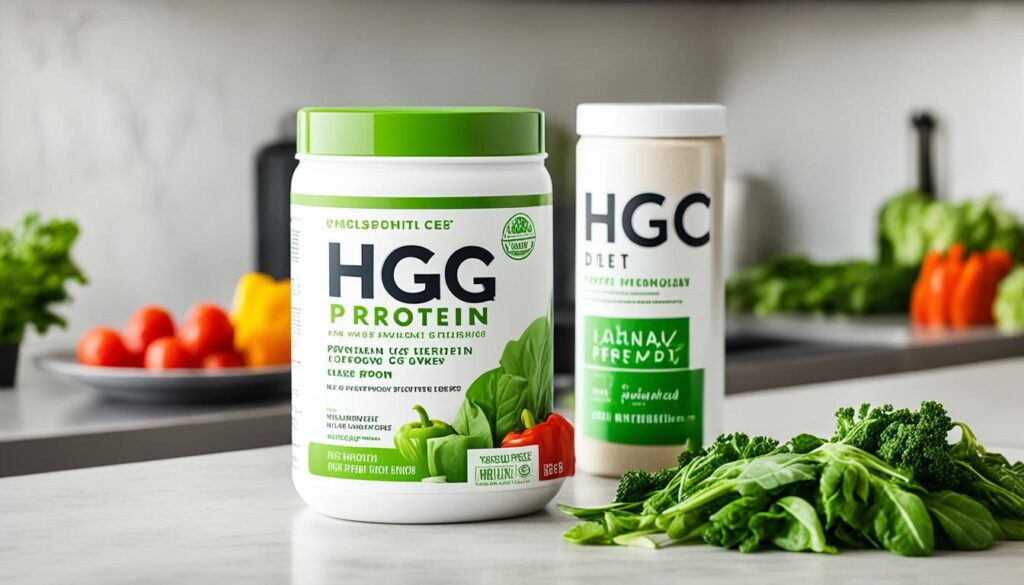
Protein powders can be a convenient and versatile option for vegetarians on the HCG diet. When animal protein is restricted, vegetarian-friendly protein powders can help meet the protein needs of vegetarians while following the HCG diet. Here are some vegetarian protein powder options:
- Rice protein powder: Made from rice, this plant-based protein powder is a suitable option for vegetarians on the HCG diet. It is low in carbs and can be easily incorporated into smoothies or shakes.
- Natural whey powder: While whey protein is derived from milk, natural whey powder made from grass-fed cows is a vegetarian-friendly option. It is rich in protein and provides essential amino acids.
- Sun-warrior protein: This vegan protein powder is made from a blend of plant-based sources like pea protein, brown rice protein, and quinoa protein. It is a complete protein source and ideal for vegetarians on the HCG diet.
- Vegan whey powder: Specifically formulated for vegans, this plant-based protein powder is made from a combination of pea protein and other plant proteins. It offers a high protein content without any animal-derived ingredients.
When choosing a protein powder, it is important to opt for options that have 5 grams of carbs or less per serving and are sweetened only with stevia or xylitol to align with the HCG diet guidelines. Incorporating these protein powders into your HCG diet plan can help you meet your protein requirements and maintain a balanced vegetarian meal plan.
The Benefits of Vegetarian Protein Powder Options
Vegetarian protein powders offer several benefits that make them suitable for vegetarians on the HCG diet:
- Plant-based protein: Vegetarian protein powders are made from plant sources like rice, peas, and quinoa, providing a clean and sustainable protein option for vegetarians.
- Complete amino acid profile: Many vegetarian protein powders offer a complete amino acid profile, meaning they provide all the essential amino acids necessary for optimal health and muscle recovery.
- Convenience: Protein powders are easy to incorporate into your daily routine. They can be added to smoothies, shakes, or used in cooking and baking to boost your protein intake without compromising your vegetarian diet.
- Provides satiety: Protein is known for its satiating effect, which can help control hunger and cravings while following the HCG diet. Adding protein powder to your meals can help you feel fuller for longer.
- Enhances muscle recovery: Protein powders are a convenient way to support muscle recovery and repair after exercise, especially for vegetarians who may have limited protein sources.
By incorporating vegetarian protein powder options into your HCG diet plan, you can ensure that you meet your protein needs while following a vegetarian lifestyle. Remember to consult with a healthcare professional before making any dietary changes and to choose protein powders that align with the HCG diet guidelines.
Vegetarian Dairy and Cheese Options for the HCG Diet
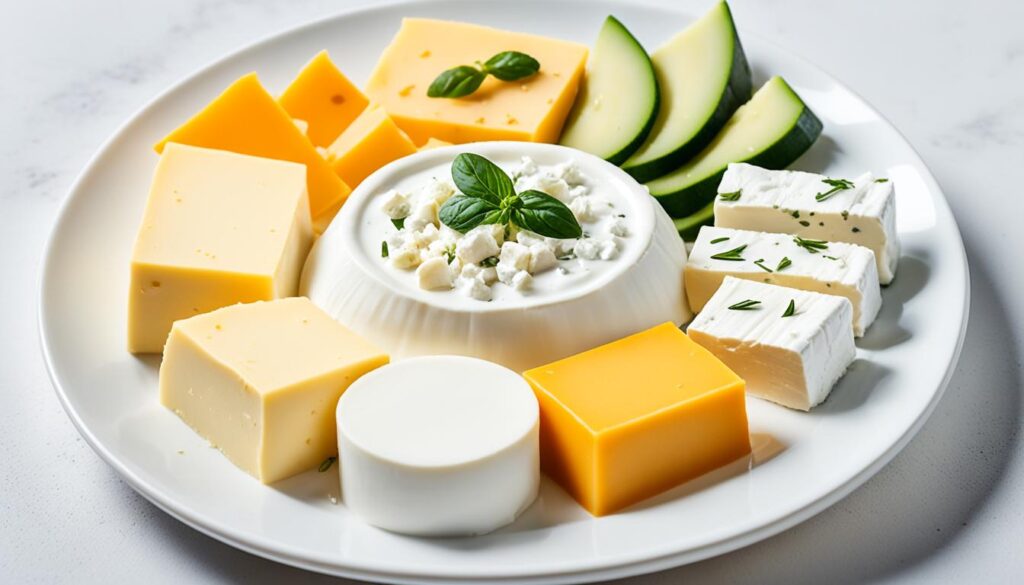
As a vegetarian on the HCG diet, you have a variety of dairy options that can be incorporated into your meals. These alternatives provide essential protein and nutrients while adhering to your dietary preferences. Here are some vegetarian-friendly choices to consider:
Vegan cottage cheese: Made from plant-based ingredients such as tofu or almonds, vegan cottage cheese is a great dairy substitute for the HCG diet. It is low in fat and calories, providing a protein-packed option for your meals.
Whole eggs: If you consume eggs as part of your vegetarian diet, whole eggs can be included in your HCG meal plan. They are an excellent source of protein and essential nutrients.
Egg replacers: If you prefer to avoid eggs altogether, there are various egg replacers available in the market that can mimic the consistency and texture of eggs in recipes.
Vegetarian cheese: There are numerous vegetarian cheese alternatives made from plant-based ingredients like cashews, almonds, or soy. These cheeses can be used in cooking or enjoyed on their own.
Non-dairy milk alternatives: Almond milk and other non-dairy milk options can be used as substitutes for regular cow’s milk. These plant-based alternatives are lower in calories and can be added to your HCG meals or beverages.
When selecting dairy options for the HCG diet, it is crucial to choose low-fat or no-fat varieties to ensure they fit within the calorie and protein requirements of the diet plan. Incorporating these vegetarian dairy alternatives can provide you with the necessary protein and nutrients while maintaining your commitment to a plant-based lifestyle.
| Dairy Option | Pros | Cons |
|---|---|---|
| Vegan cottage cheese | – Low in fat and calories – High in protein |
– May have a different taste and texture compared to traditional cottage cheese |
| Whole eggs | – Excellent source of protein – Contains essential nutrients |
– Not suitable for vegans or those with specific dietary restrictions |
| Egg replacers | – Mimic the texture and consistency of eggs – Suitable for individuals with egg allergies or dietary restrictions |
– May not have the exact taste as real eggs |
| Vegetarian cheese | – Made from plant-based ingredients – Provides a wide range of flavors |
– Some varieties may contain added oils or fillers |
| Non-dairy milk alternatives | – Lower in calories than regular milk – Can be used in cooking and beverages |
– May have a distinct taste and texture compared to cow’s milk |
Remember to consult with a healthcare provider or nutritionist before making any significant changes to your diet plan. They can provide personalized guidance and ensure that your chosen vegetarian dairy options align with your overall health goals.
Plant-Based Protein Sources for Vegetarians on the HCG Diet
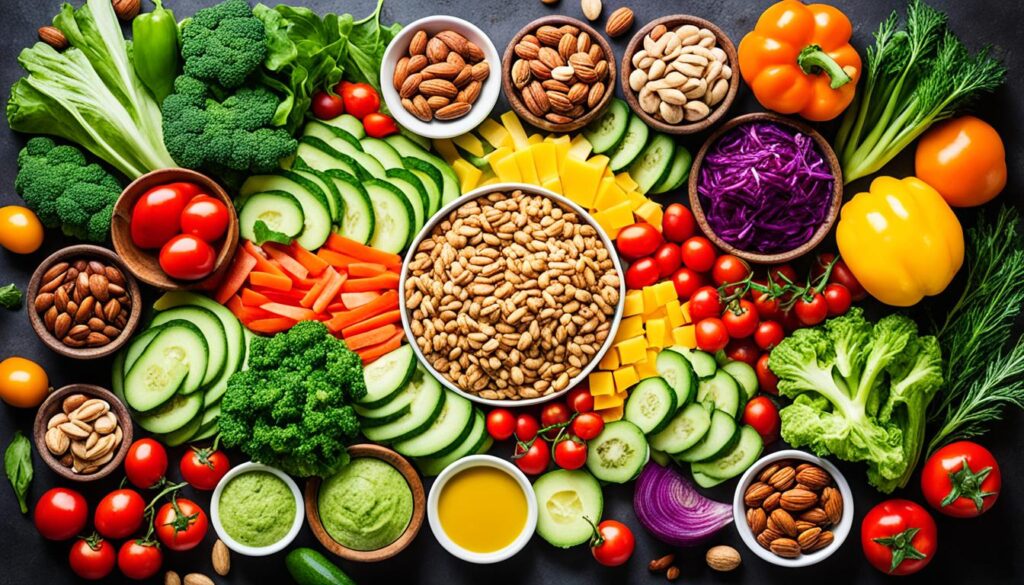
In addition to traditional vegetarian protein options, there are several plant-based protein sources that vegetarians on the HCG diet can incorporate into their meals. These include soy products like soybeans, tofu, tempeh, seitan, and textured vegetable protein (TVP). Legumes such as kidney beans, black beans, soybeans, and adzuki beans are also high in protein.
These plant-based protein sources provide essential amino acids to support muscle growth and repair, and they are low in fat and cholesterol. They are versatile ingredients that can be used in a variety of dishes, including stir-fries, salads, soups, and stews.
“Vegetarians following the HCG diet can enjoy the benefits of plant-based protein sources while staying true to their dietary preferences.”
When incorporating plant-based protein sources into the HCG diet, it’s important to pay attention to the recommended daily protein intake. Exceeding the limit of 70g per day can hinder weight loss progress. To ensure a balanced diet, vegetarians should also include other macro and micronutrients from vegetables, fruits, and carbohydrates.
By diversifying protein sources and embracing plant-based alternatives, vegetarians can successfully follow the HCG diet and achieve their weight loss goals while staying true to their lifestyle choices. The variety offered by plant-based proteins ensures that meals are enjoyable, nutritious, and sustainable for long-term adherence to the HCG diet.
Grains, Seeds, and Superfoods for Vegetarians on the HCG Diet
While grains are not recommended in large doses or frequency on the HCG diet, there are certain high-protein grains that vegetarians can include in their meals, such as quinoa, wild rice, couscous, and buckwheat groats. These grains provide essential nutrients and fiber, making them suitable options for vegetarians on the HCG diet. Incorporating these grains into your meals can help ensure a balanced and nutritious diet while following the HCG protocol.
In addition to grains, there are plenty of protein-rich seeds that can be included in the vegetarian HCG diet. Flaxseeds, pumpkin seeds, and sesame seeds are excellent sources of vegetarian-friendly protein. These seeds can be consumed as snacks, added to salads or smoothies, or used as toppings for various dishes. Incorporating these seeds into your diet can help boost protein intake and provide additional health benefits.
To further enhance the nutritional profile of your vegetarian HCG diet, consider incorporating superfoods. Superfoods are nutrient-dense foods that provide a wide range of vitamins, minerals, and antioxidants. Some superfoods suitable for vegetarians on the HCG diet include:
- Hemp hearts: Rich in essential fatty acids and protein, hemp hearts can be sprinkled on top of salads or added to smoothies.
- Chia seeds: High in fiber and omega-3 fatty acids, chia seeds can be used to make chia pudding, added to yogurt, or used as an egg substitute in baking.
- Spirulina powder: Packed with protein, vitamins, and minerals, spirulina powder can be mixed into smoothies or added to homemade energy bars.
- Cacao beans: Cacao beans are a rich source of antioxidants and can be used to make healthy desserts or added to smoothies for a chocolatey flavor.
By incorporating these grains, seeds, and superfoods into your vegetarian HCG diet, you can ensure a varied and nutrient-rich meal plan while successfully following the HCG protocol.
Conclusion
The HCG diet offers viable weight loss options for vegetarians by incorporating vegetarian-friendly protein sources, vegetables, fruits, carbohydrates, beverages, and other plant-based alternatives. With careful meal planning and consultation with a healthcare provider, vegetarians can successfully follow the HCG diet while adhering to their dietary preferences and achieving their weight loss goals.
Consulting with a healthcare provider before starting any diet plan is essential to ensure that the chosen alternatives align with the guidelines and restrictions of the HCG diet. This will help vegetarians tailor their meal plans to meet their specific nutritional needs and avoid any potential adverse effects.
By embracing vegetarian-friendly options and making conscious choices, vegetarians can enjoy the benefits of the HCG diet. With dedication and adherence to the prescribed guidelines, vegetarians can lose weight effectively and improve their overall health and well-being.
FAQ
What are the vegetarian-friendly protein sources for the HCG diet?
Vegetarian-friendly protein sources for the HCG diet include protein powder, cottage cheese, tofu, eggs, quinoa, and beans.
What are the vegetable options for vegetarians on the HCG diet?
Vegetarians on the HCG diet can choose from a variety of vegetables such as kale, spinach, lettuce, chard, cucumbers, cabbage, tomatoes, and more.
What fruits can vegetarians on the HCG diet consume?
Vegetarians on the HCG diet can enjoy apples, oranges, grapefruits, and strawberries as part of their meal plan.
Are there carbohydrate sources for vegetarians on the HCG diet?
Vegetarians on the HCG diet can include low-carb options like breadsticks or melba toast as their carbohydrate sources.
What beverage choices are available for vegetarians on the HCG diet?
Vegetarians on the HCG diet can choose from tea, coffee, herbal teas, green tea, water, soy milk, almond milk, and approved seasonings and additives.
Are there protein powder options for vegetarians on the HCG diet?
Vegetarians on the HCG diet can choose from various vegetarian-friendly protein powders like rice protein powder, natural whey powder, sun-warrior protein, and vegan whey powder.
What are the vegetarian dairy and cheese options for the HCG diet?
Vegetarians on the HCG diet can consume vegan cottage cheese, whole eggs, egg replacers, vegetarian cheese, and non-dairy milk alternatives like almond milk.
What are the plant-based protein sources for vegetarians on the HCG diet?
Vegetarians on the HCG diet can incorporate plant-based protein sources like soy products (tofu, tempeh, seitan, and TVP) and legumes (kidney beans, black beans, and soybeans) into their meals.
Can vegetarians on the HCG diet include grains, seeds, and superfoods?
Yes, vegetarians on the HCG diet can include high-protein grains like quinoa, wild rice, couscous, and buckwheat groats, as well as protein-rich seeds and superfoods like flaxseeds, pumpkin seeds, hemp hearts, and chia seeds.
Can vegetarians follow the HCG diet effectively?
Yes, vegetarians can modify the HCG diet to cater to their dietary preferences by incorporating vegetarian-friendly alternatives and follow the diet effectively.

